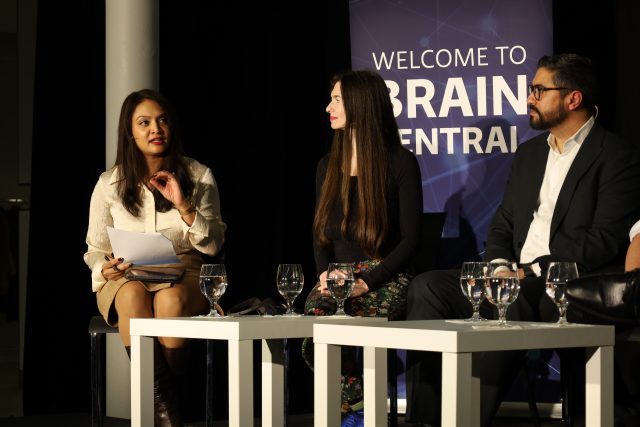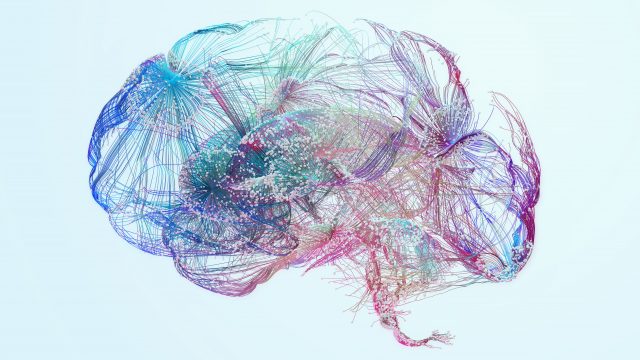In this era of big data and analytics, organizations are looking for ways to make use of all the information available to facilitate innovation, decision making and operations. Big data analytics in health research has been an important topic for the past few years and making data more accessible to a larger number of researchers leads to more efficient research strategies and creates new opportunities for scientific discoveries. When scientists have the opportunity to collaborate and share data, the value of each of their work is maximized and can be built on collectively.
The Ontario Brain Institute (OBI) has developed and continues to improve its data integration platform called Brain-CODE in order to support greater collaboration among neuroscientists in Ontario. Brain-CODE not only captures research and clinical data from different studies in a standardized way, it also enables researchers to share data with each other and explore new relationships between data that were previously very difficult if not impossible to see.
Currently, OBI runs five research programs in partnership with researchers and collaborators from many institutions and companies across Ontario. Each program is focused on different brain disorders or groups of disorders. The programs collect various data types including clinical, neuroimaging, and molecular which creates an unprecedented opportunity for discovery among Ontario’s neuroscience community—Brain-CODE is the platform that makes this opportunity a reality.
I’ve had the opportunity to be part of the Brain-CODE team as the Informatics and Analytics Intern at OBI for four months. This experience has helped me become more familiar with the type of work that’s being done and the types of challenges that are involved in developing the platform. There are many things to consider when developing a tool like Brain-CODE. Beyond the platform itself, strategic approaches always need to be taken to topics like data governance, privacy and security, and data standardization. OBI needs to make sure that researchers can use Brain-CODE to its full extent by enabling them to adapt to new ways of collecting and sharing their research data. Moreover, Brain-CODE has to use the best approaches to properly pair the data with visual analytics to ensure it is presented in a way that researchers can easily understand and use. As part of the ongoing development of Brain-CODE, many questions regarding different aspects arise along the way: how to best standardize the different types of data that are entered into Brain-CODE to allow for efficient comparison of data? How to protect patients’ personal health information? How to get the most out of the use of Brain-CODE’s data by partnering with other databases? And so on. Of course none of these challenges and questions can be answered by a single person, as they all involve sensitive decision making. Domain experts need to be involved so that the team makes sure it has the best advice on how to move forward. So how does OBI tackle all these questions and concerns? By bringing together experts in the field.
For the purpose of overseeing the development, implementation and operations of Brain-CODE, an Informatics Steering Committee has been created, consisting of OBI’s senior management. The Informatics Steering Committee meets with the Brain-CODE team on a regular basis to monitor and advise on all issues related to the development of Brain-CODE and ensure that its progress is in line with the OBI’s vision as a whole.
To support the direction of Brain-CODE in different capacities, OBI has established two advisory committees that bring together international experts in neuroinformatics, big data analytics, and data privacy and security: the Brain-CODE Advisory Committee and the Brain-CODE Analytics Blue Ribbon Advisory Committee.
The Brain-CODE Advisory Committee provides advice on initiatives focusing on the overarching goals of OBI and issues related to the facilitation of research among scientists. This committee consists of international members who have expertise in the following domains: data privacy and security, industry (clinical trials expertise), and bioinformatics. The members make recommendations on different strategies and aspects of the platform to ensure that Brain-CODE meets international best practices on data organization, sharing and analysis.
The Brain-CODE Analytics Blue Ribbon Advisory Committee (Analytics Advisory Committee) is geared towards the development of the analytics capacity of the platform. The committee advises on the adoption of effective methods for integrated data analysis. It consists of international members with expertise in knowledge representation, machine learning, modelling, as well as different methods of data analysis such as clinical, imaging and genomic. The Analytics Advisory Committee members make recommendations on incorporating new analytics approaches on Brain-CODE to help make sense of all the different types of data.
I had the privilege to help plan and attend the Brain-CODE Advisory Committee meeting in May 2015. The Brain-CODE team put together an agenda for the day, which included different topics regarding platform development and strategy. I found all the members of the committee to be well-rounded and experienced individuals who were engaged in providing expert advice to improve different areas of the platform. There were discussions regarding policies and governance, federation and linking with other databases as well as platform development updates. The members advised on the direction and progress of Brain-CODE to ensure that it is aligned with OBI’s goal of maximizing impact for neuroscience researchers and patients, and to also ensure that Brain-CODE continues to meet international best practices on data sharing and analysis.
OBI’s big data opportunity really comes to life with Brain-CODE: “my research lab is not only at Queen’s University in Kingston anymore, it’s all over the Province of Ontario” said Dr. Doug Munoz, one of the principal investigators for OBI’s neurodegenerative research program at Queen’s University. The development of Brain-CODE is not possible without the advice of experts in related fields. The Brain-CODE team always makes sure to actively seek recommendations from members of different committees that OBI has established on all issues relating to the management, development, implementation and operations of the platform. Thanks to all the expertise involved in this project, Brain-CODE is well positioned to have a positive impact on the way neuroscience research is done across Ontario.
By: Atena Keshavarzian, OBI Intern, Informatics & Analytics


